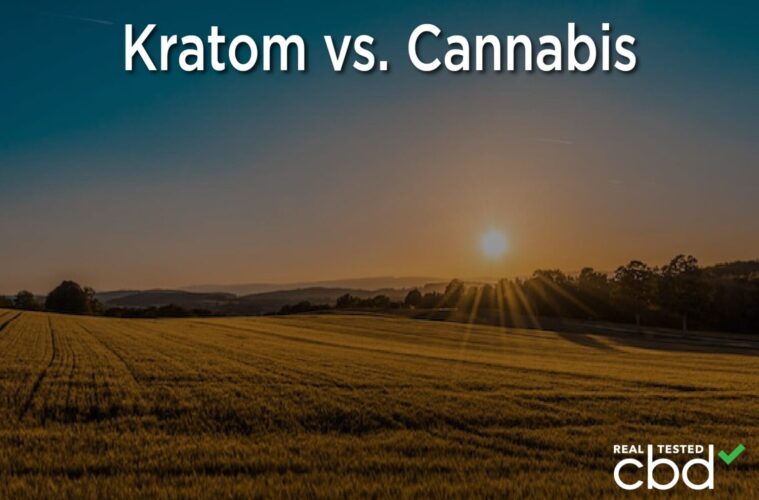View the original article about Kratom vs. Cannabis at Real Tested CBD.
If you’ve been shopping around CBD stores, vape shops, or delta-8 dispensaries, you’ve probably run across kratom. Indeed, many hemp vendors nowadays put kratom front-and-center in their advertising. Since kratom is so prominent in the CBD and delta-8 market, you may assume it has something to do with the cannabis plant.
Although many kratom proponents believe this drug shares many traits with hemp products like CBD, the two are not the same. In fact, kratom is an entirely different plant species with a unique chemistry. New customers must understand they can’t use kratom interchangeably with the delta-8 or CBD products listed on Real Tested CBD.
So, What Is Kratom Exactly?
Since kratom is so often found in cannabis shops (and has the same “k-sounding” beginning), many people confusingly think it’s a variant of the cannabis species. Honestly, kratom has a lot more to do with coffee than cannabis.
Technically, kratom comes from a plant family called Rubiaceae, which includes the Coffea plant we get coffee from. Scientists officially classify kratom as “Mitragyna speciosa.” By contrast, both marijuana and hemp are in the Cannabis sativa genus.
While both kratom and cannabis have been around for thousands of years, kratom seems to have been primarily grown in Southeast Asia. By contrast, different cannabis cultivars took root in many regions, including the Middle East, Asia, and the Hindu Kush mountains.
Like cannabis, kratom is a green plant with a long history in traditional medicine. Many natives of Southeast Asia still chew on kratom leaves for its purported therapeutic properties. However, kratom doesn’t have cannabinoids like CBD and THC. Instead, this plant contains unique alkaloids that may work similarly to prescription opioids.
There are many varieties of kratom cultivars, but most stores categorize them by their region of origin and the color of their central “veins.” The three primary colors kratom could fall into include white, green, or red. Supposedly, white-vein kratom has the most energizing effects, whereas red-vein kratom has more sedating properties. Most people familiar with kratom believe green-vein strains tend to fall in-between red and white cultivars in terms of effects.
Is It Legal For CBD Stores To Sell Kratom?
One reason kratom often winds up in cannabis shops is its iffy legality. Both kratom and cannabis are in a legal gray area throughout the Western world. Also, these green plants have many vocal supporters who believe they have legitimate therapeutic value. Given this backdrop, it’s easy to see why kratom is a natural fit for many cannabis and hemp shops.
Currently, the USA doesn’t have a ban on kratom as it does for THC-containing weed. However, there’s also no national legislation that says “kratom is legal” like the 2018 US Farm Bill does for hemp. There are also many states that have placed special restrictions on kratom products, growers, and merchants.
People interested in kratom need to verify their state doesn’t have any policies against kratom on their books before purchasing any products. Customers should also never work with kratom manufacturers that don’t supply third-party lab testing. Like the legal hemp market, the FDA doesn’t screen kratom products for quality assurance. It’s up to the kratom extractors to submit third-party lab tests that prove the purity of their products.
Why Would People Want To Try Kratom Products?
Most customers seem to get involved in kratom for pain relief. As we hinted above, the kratom plant has dozens of alkaloids that may work similarly to opioid compounds. The two most notable alkaloids in kratom are mitragynine and 7-hydroxymitragynine, so you’ll probably see the concentrations of these molecules on a lab report for kratom.
Kratom proponents believe this plant offers analgesic properties comparable to opioid pain medications but with a lower risk of side effects. Some patients say they use kratom to come off of traditional opioids without experiencing severe withdrawal.
While pain relief tends to be the top reason people try kratom, plenty of customers say that kratom has anti-stress and anti-inflammatory benefits. Some also use different varieties of kratom to help with issues like sleep or a lack of energy.
Just bear in mind that the clinical data on using kratom is low. Most of the “science” you’ll see surrounding kratom are anecdotal testimonies. That doesn’t mean kratom is worthless, but there may be significant risks to using this substance. For optimal safety, people should ask their doctor whether it’s safe to try kratom.
Please Be Extra Careful With Kratom!
At Real Tested CBD, we concentrate all of our energy on testing products from the federally legal hemp plant. However, we’ve noticed the growing popularity of kratom in the CBD and delta-8 industry. Since there’s not a ton of scientific data on kratom’s benefits, we can’t say anything definitive about its effects. Potential customers must recognize that kratom doesn’t enjoy the same legal privileges as CBD oil, nor does kratom have as many studies backing up its purported benefits.
However, if you’re dead-set on trying a kratom product, you must go with a reputable brand that produces third-party lab results. The kratom market isn’t well-regulated, and many companies are offering lackluster products just to make a quick buck. Hopefully, as kratom continues to dominate the headlines, more researchers will have access to this plant to better understand its true potential. Until then, customers need to be incredibly cautious about jumping into the young kratom industry.
Learn more about Delta-8 THC at Real Tested CBD.
Advertising disclosure: We may receive compensation for some of the links in our stories. Thank you for supporting Irvine Weekly and our advertisers.


